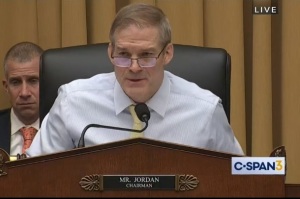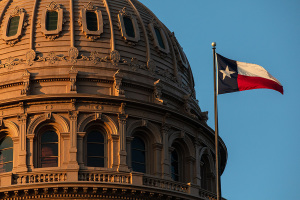Interview: John Bolton on Obama's Israeli Trip
Judging from the televised images, President Obama's first state visit to Israel was a love fest. The Israelis literally and figuratively rolled out the red carpet, even giving Mr. Obama a medal to thank him for his friendship to the Jewish people. The President, in turn, literally and figuratively hugged Israeli Prime Minister Benjamin Netanyahu and repeatedly called him by his nickname, "Bibi," as though they had been best pals for years. The days of frosty, even frigid, relations between the two leaders seemed over.
But John Bolton isn't buying it. The long-serving American diplomat and national security expert, who served as the U.S. Ambassador to the United Nations under President George W. Bush, says behind the scenes there is still trouble in paradise.
I interviewed him by phone yesterday and his message was crystal clear. On the three critical issues facing the U.S. and Israel in the Middle East – dealing with the Iran nuclear threat, the implosion of Syria, and the peace process – Bolton says the President's objectives have not changed one iota. Netanyahu cannot count on this White House, he argues. And if Israel is going to strike Iran, they're going to have to do it this year, and on their own.
JR: What's your assessment of President Obama's trip to Israel?
Bolton: I think the President had two objectives. One was political, to try to smooth over some of the differences in the relationship with Israel in general, and with [Israeli Prime Minister Benjamin] Netanyahu in particular.
The other purpose was to have substantive, private discussions with the Israeli leadership to tell them not to even think about using military force to stop Iran from building nuclear weapons, and pressure them to make more concessions to the Palestinians.
I think the President accomplished the political objective the moment he stepped off the plane, embraced Netanyahu, and visited the Dead Sea Scrolls and [Zionist leader Theodor] Herzl's tomb, and made all his other public stops. It was a cosmetic effort to stem some of the criticisms he's been taking in recent years, and on that level it was somewhat successful.
But while the optics may have improved, the fundamental differences remain exactly what they were. I don't think Obama changed his positions, or softened his positions. I think he remains just as committed to preventing an Israeli first strike against Iran's nuclear program, and to creating a Palestinian state very much along the '67 borders with minimal changes.
Some analysts – including some conservatives – have suggested that the President retreated somewhat by not insisting that Israel stop building settlements as a precondition to direct negotiations with the Palestinian Authority. But I don't see it that way. I think that's a tactical decision that isn't that important. The point, for Obama, is to get the talks [between Israel and the Palestinians] going again, because once negotiations begin, Obama knows he will be free to pressure Israel to stop building settlements and to make more land concessions. So I didn't detect any real substantive change on the settlements issue.
JR: So back to the Iran issue, just to be clear, you don't believe the President gave Netanyahu a "green light" to hit Iran. To the contrary, you believe he is continuing to pressure Israel not to strike?
Bolton: I watched the President's public statements very carefully. The President said several times that Israel has the right to defend itself. How could he say anything else? Of course they have that right. But in private he's saying, "Don't do it."
The calculus that Obama leaves with Netanyahu is that the U.S. won't really back Israel if he orders a first strike. There is an implied threat here, that if Israel uses military force, that we will not will have their back, that we will not resupply them with planes or other weapons, that we will not help them if they're attacked by missiles from Hezbollah and Hamas, and so forth.
This is a critical factor for an Israeli Prime Minister to weigh, the possibility that Israel wouldn't have full U.S. assistance in a major regional war. Now, I don't think Obama could sustain that position because of strong Israeli support in Congress and in the public. Polls are showing the American people actually support military action against Iran's nuclear program. But it's challenging for Israeli leaders because there could be a window of vulnerability if there is a sharp disagreement inside Washington over whether and how to help Israel during such a conflict.
JR: How much time does Israel have to make a final decision about going to war?
Bolton: Time is growing short. Iran may be developing facilities we don't know about. I think this is the year of decision. If the Israelis don't act now, they're not going to have as advantageous an opportunity in the future as they do now. I think they're running out of time.
What Netanyahu is not going to do is rely on the U.S. to take care of this.
If you asked Israel, they would prefer the U.S. to take action, of course. It's the difference in capabilities that drives the different views of timing. The U.S. has much more capability to set Iran's nuclear program back for much longer. That's why the White House doesn't feel the same sense of urgency that Israel feels.
Personally, I would have attacked years ago because you set the program back further when Iran doesn't have all the knowledge and materials to build a Bomb.
I think the Prime Minister has until the end of the year to strike. If he doesn't do it by the end of the year, then I think it will move beyond Israel's capabilities.
JR: One more question, on Syria. How do you assess the situation in Syria, and what should the U.S. be doing there right now?
Bolton: It's a very dangerous situation. The highest priority for the U.S. is to make sure Syria's chemical and biological weapons don't get used, and don't get transferred out of the country into the hands of state sponsors of terrorism or terrorist groups. This is a priority we share with Israel, Turkey, Jordan and with every friendly country in the region, of course. But it's very difficult to do. As we've seen, there are conflicting reports about whether the rebels or the regime may have used chemical weapons in recent days. I would not vouch for the safety of Syria's chemical and biological arsenal. It's a very dangerous moment.
As for helping the rebels, look, we have not yet been given the name of a single Syrian opposition leader whom we can trust to not to unleash a bloodbath if he gets into power, and destroy Syria's stockpile of chemical weapons, and stabilize the country. The opposition is fragmented and divided, so I'm not optimistic that we can do much to help at the moment.




























